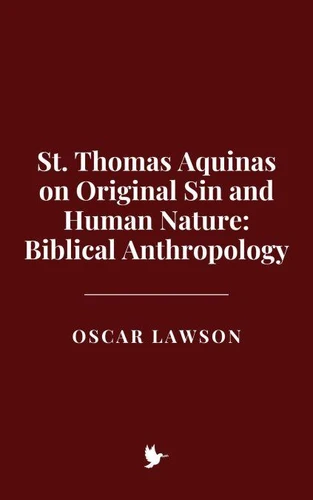St. Thomas Aquinas on Original Sin and Human Nature: Biblical Anthropology
Par :Formats :
Disponible dans votre compte client Decitre ou Furet du Nord dès validation de votre commande. Le format ePub est :
- Compatible avec une lecture sur My Vivlio (smartphone, tablette, ordinateur)
- Compatible avec une lecture sur liseuses Vivlio
- Pour les liseuses autres que Vivlio, vous devez utiliser le logiciel Adobe Digital Edition. Non compatible avec la lecture sur les liseuses Kindle, Remarkable et Sony
 , qui est-ce ?
, qui est-ce ?Notre partenaire de plateforme de lecture numérique où vous retrouverez l'ensemble de vos ebooks gratuitement
Pour en savoir plus sur nos ebooks, consultez notre aide en ligne ici
- FormatePub
- ISBN8231607655
- EAN9798231607655
- Date de parution25/06/2025
- Protection num.pas de protection
- Infos supplémentairesepub
- ÉditeurWalzone Press
Résumé
This book offers an unparalleled deep dive into one of the most profound theological doctrines shaping Christian understanding of humanity's fall and redemption. Drawing on Scripture, patristic wisdom, and Aristotelian philosophy, this scholarly yet accessible volume illuminates how Aquinas masterfully integrated biblical anthropology with metaphysical insight to explain original sin, its effects on human freedom and will, and the transformative power of grace and justification.
Tracing the biblical roots from Genesis and Paul's letters to Romans, the book reveals how Aquinas's thought not only shaped medieval scholasticism but also laid the foundation for enduring Christian teachings on sin, grace, and salvation. Readers will discover a nuanced exploration of key themes: the loss of original justice, concupiscence, the wounded will, and the indispensable role of baptism and the sacraments in restoring fallen nature.
Beyond academic analysis, this work bridges historical theology and contemporary relevance, demonstrating how Aquinas's vision speaks powerfully to modern debates about human dignity, moral struggle, freedom, and divine mercy. It is an essential resource for theologians, students, clergy, and anyone seeking a rigorous yet inspiring account of the human condition and God's redemptive grace. With erudition and clarity, St.
Thomas Aquinas on Original Sin and Human Nature revitalizes classical theology for today's readers, offering profound insights into the mystery of sin and salvation that continue to shape faith and life across the centuries.
Tracing the biblical roots from Genesis and Paul's letters to Romans, the book reveals how Aquinas's thought not only shaped medieval scholasticism but also laid the foundation for enduring Christian teachings on sin, grace, and salvation. Readers will discover a nuanced exploration of key themes: the loss of original justice, concupiscence, the wounded will, and the indispensable role of baptism and the sacraments in restoring fallen nature.
Beyond academic analysis, this work bridges historical theology and contemporary relevance, demonstrating how Aquinas's vision speaks powerfully to modern debates about human dignity, moral struggle, freedom, and divine mercy. It is an essential resource for theologians, students, clergy, and anyone seeking a rigorous yet inspiring account of the human condition and God's redemptive grace. With erudition and clarity, St.
Thomas Aquinas on Original Sin and Human Nature revitalizes classical theology for today's readers, offering profound insights into the mystery of sin and salvation that continue to shape faith and life across the centuries.
This book offers an unparalleled deep dive into one of the most profound theological doctrines shaping Christian understanding of humanity's fall and redemption. Drawing on Scripture, patristic wisdom, and Aristotelian philosophy, this scholarly yet accessible volume illuminates how Aquinas masterfully integrated biblical anthropology with metaphysical insight to explain original sin, its effects on human freedom and will, and the transformative power of grace and justification.
Tracing the biblical roots from Genesis and Paul's letters to Romans, the book reveals how Aquinas's thought not only shaped medieval scholasticism but also laid the foundation for enduring Christian teachings on sin, grace, and salvation. Readers will discover a nuanced exploration of key themes: the loss of original justice, concupiscence, the wounded will, and the indispensable role of baptism and the sacraments in restoring fallen nature.
Beyond academic analysis, this work bridges historical theology and contemporary relevance, demonstrating how Aquinas's vision speaks powerfully to modern debates about human dignity, moral struggle, freedom, and divine mercy. It is an essential resource for theologians, students, clergy, and anyone seeking a rigorous yet inspiring account of the human condition and God's redemptive grace. With erudition and clarity, St.
Thomas Aquinas on Original Sin and Human Nature revitalizes classical theology for today's readers, offering profound insights into the mystery of sin and salvation that continue to shape faith and life across the centuries.
Tracing the biblical roots from Genesis and Paul's letters to Romans, the book reveals how Aquinas's thought not only shaped medieval scholasticism but also laid the foundation for enduring Christian teachings on sin, grace, and salvation. Readers will discover a nuanced exploration of key themes: the loss of original justice, concupiscence, the wounded will, and the indispensable role of baptism and the sacraments in restoring fallen nature.
Beyond academic analysis, this work bridges historical theology and contemporary relevance, demonstrating how Aquinas's vision speaks powerfully to modern debates about human dignity, moral struggle, freedom, and divine mercy. It is an essential resource for theologians, students, clergy, and anyone seeking a rigorous yet inspiring account of the human condition and God's redemptive grace. With erudition and clarity, St.
Thomas Aquinas on Original Sin and Human Nature revitalizes classical theology for today's readers, offering profound insights into the mystery of sin and salvation that continue to shape faith and life across the centuries.

















